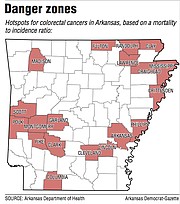Follow up, follow up, follow up is the message for health care providers attending a meeting in Little Rock this week that's focused on improving screening rates for colorectal cancers -- the second-leading cause of cancer deaths in the state.
For the Southeastern Colorectal Cancer Consortium, advocates, providers and cancer survivors from 13 states and Puerto Rico convened in the DoubleTree hotel to talk about fighting a cancer that disproportionately affects the region.
Their strategies included repeated contacts via phone or mail about screenings, adding standing orders to charts, refining data-collecting processes to make sure every type of screening is logged in electronic records and overcoming patient hesitation, panelists and attendees said.
"It's following up with them and saying, 'hey, we really need to get you in,'" Deborah Tennison of the Mena Family Health Center said during a panel discussion on boosting screenings in rural areas.
She said patients sometimes aren't aware that they need to be screened, but "I hope we never have a patient that comes into our clinic and says that."
Other Arkansas groups, such as Community Health Centers of Arkansas, are working to harness the spirit of competition. Community Health Centers of Arkansas created infographics to show how its clinics stack up against state screening rates.
There are about 1,400 new cases and 600 related deaths from colorectal cancers annually in Arkansas, which also has the lowest screening rate in the nation, said state Department of Health chronic disease director Dr. Appathurai Balamurugan.
In opening remarks for the event, he said one national study on where colorectal cancer screenings could have the most impact had highlighted the state's Mississippi Delta.
"This was a moment when we realized, in Arkansas, that we have a long way to go," he said.
The department currently has more than $900,000 in grants and other funding earmarked to address colorectal cancers and its survivors, according to a spokesman.
This year's consortium focused on screenings because long-term survival rates can be high for colorectal cancers if the diseases are caught before they progress.
The National Colorectal Cancer Roundtable, consisting of medical professionals and advocates, aspires to have 80% of American adults age 50 or older screened, undergoing such procedures as colonoscopies, sigmoidoscopies or fecal immunochemical tests.
That goal requires surmounting many obstacles, including low proximity to specialists outside of urban areas and convincing patients that it's better to have answers about their health.
"They don't want to know what they don't know, and they're fearful of what the outcome could be," said Stacey George, who works in outreach at the Arkansas Foundation for Medical Care.
About 120-140 attendees were expected at the meeting, which is in its fourth year but is being held in Arkansas for the first time. The meeting began Wednesday and continues through today.
Nancie Stover-Nicholson attended the meeting as part of her responsibilities for a new job at the American Cancer Society in South Carolina.
She said she was learning that many states have the same barriers to colorectal cancer screenings, and she was intrigued by ideas she had heard to remedy that, including from a provider that explored partnering with a ride-hailing company to drive patients to screenings.
"I'm like, let me Google this when I get on home," she said.
Metro on 06/21/2019
